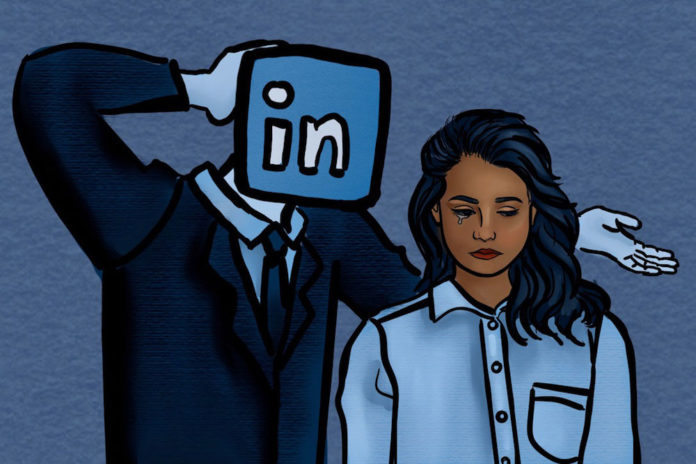Instagram has a well-documented history as a wrecking ball of young adult mental health, but on LinkedIn, our shameless self-promotion wears the patina of corporate respectability. I created my account during my senior year of high school on the advice of a classmate who insisted that an online presence would help me stand out in the college admissions process. In a grave procedure that felt halfway between a baptism and a seance, we dutifully cobbled together a portfolio of our experiences and skills. There was something disquieting about typing in awards and test scores — haven’t we all learned since childhood to be humble and private about even our smallest achievements? Many of my friends openly admit to enhancing them: English 12 papers became “projects”; B-pluses on French fill-in-the-blank worksheets became “Full Professional Proficiency.”
This has always been the nature of social media, of course; numbers get rounded up and edges get smoothed out. But on LinkedIn, this has a particularly noxious effect. Not only do we compare ourselves with others, we validate and even celebrate the grounds on which we do so. More and more people are realizing that the perfect people we often see on Instagram are unrealistic points of reference, and that body shape and skin tone are terrible ways of evaluating ourselves and others. So why do half a billion people normalize ranking ourselves based on our years of work experience, our metrics of skills and endorsements and whether or not we have whatever the hell “synergy” is?
To get a job, of course, is the obvious answer. Even as a first year, I have near-constant worries about whether I’m developing enough skills to make my own and my family’s college investment worth it by securing summer and post-graduation employment. I can only imagine how upperclassmen feel, with their finish line approaching rapidly. Where I grew up, in the competitive, results-oriented Bay Area, many people ponder their educational and professional trajectories from an absurdly early age. I’ve seen firsthand the stress and toxic competitiveness it can cause. LinkedIn is the spiritual home of that stress.
I’m absolutely guilty of obsessing over the wording of my profile summary and the lighting of my photo, of checking others’ profiles and worrying that database ninjas and content innovators far outstrip me as a person. I get notifications whenever my connections start a job or add a new skill, as if the website is daring me to do the same. And that’s just the profile section. However, at the nadir of my depravity, I did take a peek at the circle jerk that is the LinkedIn feed.
I can’t possibly sum up my findings better than the aptly-named “Crap of LinkedIn” Twitter account can: countless stories of young professionals spilling their coffee, getting stuck on their morning commute or underestimating their colleagues only to realize that sales is connection, that marketing should be storytelling and that we are all worthy of love.
As much as these quasi-inspiring nuggets made me laugh and cringe, I did see an interesting pattern in them. On Instagram people share moments and quotations, and on LinkedIn it’s promotions and “micro-objectives.” Someone told me in a recent conversation that human beings are like squirrels, storing away whatever acorns of wisdom and insight we can find to arm ourselves in a world that puts so much personal and professional pressure on us. Maybe even the insidious side of social media — the airbrushing, self-promotion and judgment — is indicative of a more enduring pattern of human behavior that the Internet just threw into greater relief. From social circles to the workforce, the world can be a scary place, and for young adults just making their way into it, it is even scarier. Of course, we want to know where we stand in the world and inch our way up — the alternative, we are often told, is to be left behind socially and professionally. LinkedIn and Instagram didn’t create these fears; they simply capitalize on them.
Ideally, LinkedIn itself would make user profiles visible mainly to recruiters, not envious colleagues — or at least, they would stop notifying people of who has viewed their profile or recently learned to kickbox. But in the meantime, I’m not deleting my LinkedIn account or (necessarily) recommending that you do either. Especially as a woman of color and an aspiring print journalist, I need to hustle to showcase my work and put myself out there. I can’t afford to shut down any possible avenues for doing so.
But I want to be more mindful of how I use this platform and all social media. I want to spend less time on it, surely, and more time building concrete skills doing things I enjoy. I want to stop putting others’ online selves on a pedestal, and stop the tiny exaggerations that might cause them to do the same to me. And as clichéd as this may be, I want to recognize that kindness toward others and myself is still my most important value, no matter how much pressure I feel to make it in this world. You can trust me on this. LinkedIn did tell me I’m an All-Star.
DJ Prakash is an undeclared first year. She can be reached at dprakash@oxy.edu.
![]()




































